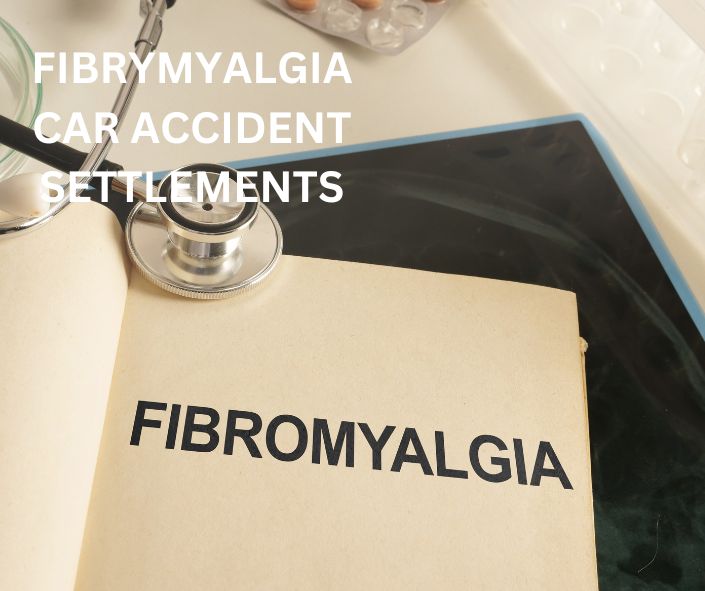Guide To Fibromyalgia Car Accident Settlements

Author: 30klife January 21, 2024
Navigating the aftermath of a car accident can be a daunting experience, especially for individuals suffering from fibromyalgia. This chronic condition, characterized by widespread pain and fatigue, can add layers of complexity to the already challenging process of seeking a settlement. In this article, we delve into the nuances of fibromyalgia in the context of car accident settlements, exploring how accidents can affect this condition, the legal avenues available, and practical steps to secure fair compensation.
Understanding Fibromyalgia and Car Accident Lawsuit Settlements
Fibromyalgia is a long-term condition that causes pain all over the body. Along with widespread pain, it is often accompanied by extreme tiredness, muscle stiffness, difficulty sleeping, and problems with mental processes like memory and concentration, known as “fibro fog.” Diagnosing fibromyalgia can be difficult due to the absence of specific tests, with doctors relying on patient history, symptoms, and physical examination.
For those living with fibromyalgia, daily life can be challenging, with symptoms fluctuating and affecting various aspects of life. When considering a car accident settlement, it’s important to document how fibromyalgia impacts your daily routine, work capacity, and overall quality of life, as this information can be crucial in legal and insurance claims.
Fibromyalgia Aggravation Due to Car Accidents
 A car accident can exacerbate pre-existing conditions like fibromyalgia. The stress and trauma of the accident can lead to a flare-up of symptoms, making pain and fatigue more pronounced. Medical research suggests that traumatic events can significantly impact fibromyalgia, potentially worsening the condition.
A car accident can exacerbate pre-existing conditions like fibromyalgia. The stress and trauma of the accident can lead to a flare-up of symptoms, making pain and fatigue more pronounced. Medical research suggests that traumatic events can significantly impact fibromyalgia, potentially worsening the condition.
After an accident, it’s vital to seek medical evaluation, even if you initially feel fine. Documenting your condition post-accident is crucial, as it establishes a record of how the incident has affected your fibromyalgia. Keep detailed notes of your doctor’s visits, symptoms, and how they differ or intensify post-accident.
Legal Aspects of Fibromyalgia Claims
When it comes to legal claims, fibromyalgia presents unique challenges. While you can sue for worsening of fibromyalgia due to a car accident, the subjective nature of the condition can make it difficult to prove in a legal setting. The key is to establish a clear link between the accident and the aggravation of your fibromyalgia symptoms.
Consulting with a personal injury lawyer experienced in dealing with fibromyalgia cases is essential. They can guide you through the process of collecting the necessary medical evidence, expert testimonies, and documentation to build a strong case. Your lawyer will help articulate the impact of fibromyalgia on your life and argue for appropriate compensation.
Link Between Whiplash and Fibromyalgia
 The relationship between whiplash and fibromyalgia is a subject of ongoing medical research. Some studies suggest that individuals who experience whiplash may be more likely to develop fibromyalgia or experience a worsening of their symptoms. The physical trauma of whiplash, combined with the stress of the accident, may trigger or exacerbate fibromyalgia.
The relationship between whiplash and fibromyalgia is a subject of ongoing medical research. Some studies suggest that individuals who experience whiplash may be more likely to develop fibromyalgia or experience a worsening of their symptoms. The physical trauma of whiplash, combined with the stress of the accident, may trigger or exacerbate fibromyalgia.
If you suffer from whiplash following a car accident, it’s important to monitor your condition closely. Documenting your injuries and any new or worsening symptoms is vital. This information can be crucial in establishing a connection between the accident and your fibromyalgia in a legal claim.
Navigating Insurance Claims with Fibromyalgia
Dealing with insurance companies when you have fibromyalgia can be challenging. Insurance providers may be skeptical about the impact of an accident on your condition due to the subjective nature of fibromyalgia. To effectively communicate with insurance companies, provide detailed medical records, including a history of your fibromyalgia diagnosis, treatments, and any changes in your condition post-accident.
It’s crucial to keep a comprehensive record of all medical treatments, consultations, and recommendations from your healthcare providers. These documents serve as valuable evidence to support your claim, demonstrating the direct consequences of the accident on your fibromyalgia.
Calculating Settlements for Fibromyalgia Cases
Determining a fair settlement in fibromyalgia cases can be complex. The settlement should cover medical expenses, lost wages, and pain and suffering. Calculating these costs requires a thorough understanding of how fibromyalgia affects your ability to work, your need for ongoing medical care, and the overall impact on your quality of life.
Working closely with medical professionals and your lawyer is crucial to accurately assess the full extent of damages. They can help you understand the long-term implications of your worsened condition and quantify the financial and emotional costs.
Case Studies and Precedents
Looking at previous cases of fibromyalgia car accident settlements can provide insights and expectations for your situation. Each case is unique, but reviewing past settlements and court decisions can help gauge the range of possible outcomes. Notable cases may illustrate how courts have valued the impact of car accidents on fibromyalgia and the types of evidence that were pivotal in securing fair compensation.
Car Accident Attorney Near Me
Securing a settlement for fibromyalgia post-car accident requires patience, thorough documentation, and professional support. It’s crucial to advocate for yourself and understand your rights. Utilize available resources such as support groups, legal advice, and medical professionals specializing in fibromyalgia. Remember, you are not alone in this journey, and with the right approach, you can secure the compensation you deserve.
This article has explored the complexities of seeking a car accident settlement for individuals with fibromyalgia. From understanding the condition, its aggravation due to accidents, legal challenges, and navigating insurance claims, to calculating settlements and learning from case studies, we’ve covered essential aspects to help you in your pursuit of fair compensation. Remember, your health and well-being are paramount, and securing a settlement that reflects the true impact of the accident on your life is your right.
If you’re dealing with fibromyalgia exacerbated by a car accident, consider seeking legal counsel to guide you through the settlement process. Stay informed, document everything, and never underestimate the impact of your condition. Advocate for yourself, and don’t hesitate to reach out for professional help.
Fibromyalgia FAQ
Can a car accident cause fibromyalgia?
The relationship between a car accident and the onset of fibromyalgia is a topic of ongoing research and debate within the medical community. While a car accident is not universally accepted as a direct cause of fibromyalgia, there is evidence suggesting that physical trauma, such as that experienced in a car accident, can trigger or exacerbate the symptoms of fibromyalgia in some individuals.
Possible Link between Trauma and Fibromyalgia
- Triggering of Symptoms: Some medical studies suggest that a traumatic event, like a car accident, can trigger the onset of fibromyalgia symptoms in people who are predisposed to the condition. This could be due to the body’s response to trauma, stress, and injury.
- Exacerbation of Pre-existing Condition: In individuals already living with fibromyalgia, a car accident may worsen their symptoms. The physical and emotional stress associated with the accident can lead to an increase in pain, fatigue, and other fibromyalgia-related issues.
- Central Sensitization Theory: Fibromyalgia is believed to involve central sensitization, where the nervous system becomes more sensitive to pain signals. Trauma from a car accident could potentially contribute to or exacerbate this sensitization process.
Research and Evidence
The direct causal link between car accidents and the development of fibromyalgia is not definitively established. Research in this area is challenging due to the complex nature of fibromyalgia, which has a range of symptoms and potential contributing factors. However, some studies have observed a higher incidence of fibromyalgia following physical trauma, including car accidents.
Diagnosing and Treatment
Diagnosing fibromyalgia following a car accident can be complicated. There is no specific test for fibromyalgia; instead, diagnosis is based on symptoms, medical history, and by ruling out other conditions. If you have been in a car accident and start experiencing chronic pain, fatigue, and other symptoms typical of fibromyalgia, it’s important to see a healthcare provider for a thorough evaluation.
Legal and Insurance Considerations
From a legal and insurance perspective, if you develop fibromyalgia symptoms after a car accident, proving the connection can be challenging but not impossible. Medical records, expert testimony, and detailed documentation of your symptoms and treatments can support claims that the accident contributed to or caused your condition.
In conclusion, while a car accident may not be universally recognized as a direct cause of fibromyalgia, it can be a significant contributing factor, especially in individuals predisposed to or already living with the condition. Understanding the potential link between trauma and fibromyalgia is important for medical treatment and legal considerations following a car accident.
How much compensation for fibromyalgia after a car accident?
 The amount of compensation for fibromyalgia following a car accident can vary widely based on several factors. There is no standard amount, as each case is unique, and the compensation depends on the specific circumstances and impacts of the condition on the individual’s life. Here are key factors that influence the compensation amount:
The amount of compensation for fibromyalgia following a car accident can vary widely based on several factors. There is no standard amount, as each case is unique, and the compensation depends on the specific circumstances and impacts of the condition on the individual’s life. Here are key factors that influence the compensation amount:
- Severity and Impact of Symptoms: The extent to which fibromyalgia affects your daily life, work ability, and overall health is a critical factor. More severe symptoms that lead to higher medical expenses and greater lifestyle changes typically result in higher compensation.
- Medical Expenses: This includes costs for current and future medical treatment related to fibromyalgia. It covers doctor visits, medication, physical therapy, and any other treatments necessary to manage the condition.
- Lost Wages and Earning Capacity: If fibromyalgia symptoms prevent you from working or reduce your ability to earn income, you may be compensated for lost wages. This also includes potential future earnings lost due to the condition.
- Pain and Suffering: Compensation often factors in the physical pain and emotional distress caused by fibromyalgia. This can be subjective and varies greatly from case to case.
- Quality of Life: Fibromyalgia can significantly impact your quality of life, including your ability to engage in social activities, hobbies, and other lifestyle factors. Compensation may consider these aspects.
- Evidence and Documentation: The strength of medical evidence linking fibromyalgia to the car accident and thorough documentation of the condition’s impact on your life are crucial in determining the compensation amount.
- Legal Representation: The expertise and negotiation skills of your attorney can significantly influence the compensation amount. Experienced lawyers can effectively argue the extent of your condition and its link to the car accident.
- Jurisdiction and Precedents: Compensation can also vary based on legal precedents and the jurisdiction in which the claim is made. Different states or regions may have different laws and typical settlement amounts for similar cases.
- Insurance Policy Limits: The at-fault party’s insurance coverage limits can also affect the compensation amount. In some cases, the limits may cap the amount you can receive.
- Settlement or Court Judgement: Whether the compensation is a result of an out-of-court settlement or a court judgement can influence the amount. Settlements are often a negotiation, while court judgements are decided by a judge or jury.
It’s important to consult with a legal professional who specializes in personal injury claims and has experience with fibromyalgia cases. They can provide guidance based on the specifics of your case and the legal context in your area. Remember, each case is unique, and compensation will vary based on individual circumstances.
How can you prove that fibromyalgia was caused by a car accident?
Proving that fibromyalgia was caused by a car accident can be challenging due to the complex nature of the condition and the fact that it can be triggered by a variety of factors. However, with a strategic approach and comprehensive documentation, it is possible to build a convincing case. Here are some steps and considerations to help prove that fibromyalgia was caused or significantly worsened by a car accident:
- Medical Documentation: The most crucial element is comprehensive medical documentation. This includes medical records before and after the accident. If you had no prior diagnosis of fibromyalgia, records showing a lack of symptoms before the accident can be compelling. Post-accident medical records should detail the onset of fibromyalgia symptoms, diagnosis, and treatments.
- Expert Testimony: Medical experts, particularly those specializing in fibromyalgia, can provide testimony about how the accident could have triggered or exacerbated the condition. They can explain the link between trauma and fibromyalgia onset to a court or insurance company.
- Timeline Correlation: Establishing a clear timeline that correlates the onset or worsening of fibromyalgia symptoms with the car accident is important. This involves showing that symptoms began or intensified following the accident.
- Personal Records and Journals: Keeping a detailed journal of your symptoms, pain levels, and how they affect your daily life can help demonstrate the impact of fibromyalgia. Include notes about activities or functions you could perform before the accident that you are unable to do now.
- Witness Statements: Statements from family, friends, or colleagues who can attest to your condition before and after the accident can be helpful. They can provide an external perspective on the changes in your health and lifestyle.
- Previous Case Studies and Research: Citing scientific research or case studies that demonstrate a link between physical trauma and the onset of fibromyalgia can support your claim.
- Consistency and Honesty: Consistency in your reports and honesty about your symptoms are crucial. Exaggeration or inconsistency can undermine your credibility and weaken your case.
- Legal Assistance: Working with an attorney who has experience in handling fibromyalgia cases related to car accidents is vital. They can guide you in gathering and presenting evidence effectively and can navigate the legal challenges associated with such claims.
- Direct Cause vs. Aggravation: Understand that proving fibromyalgia was directly caused by an accident may be more difficult than proving the accident aggravated pre-existing fibromyalgia. Be clear about the specifics of your situation.
- Ongoing Medical Evaluation: Continuous medical assessment and documentation, even after the initial diagnosis, can provide further evidence of the long-term impact of the accident on your condition.
In summary, while challenging, proving that fibromyalgia was caused or aggravated by a car accident is possible with thorough medical evidence, expert testimony, detailed personal documentation, and legal support. Each case will be unique, so tailor your approach to the specifics of your situation and the available evidence.

 A car accident can exacerbate pre-existing conditions like fibromyalgia. The stress and trauma of the accident can lead to a flare-up of symptoms, making pain and fatigue more pronounced. Medical research suggests that traumatic events can significantly impact fibromyalgia, potentially worsening the condition.
A car accident can exacerbate pre-existing conditions like fibromyalgia. The stress and trauma of the accident can lead to a flare-up of symptoms, making pain and fatigue more pronounced. Medical research suggests that traumatic events can significantly impact fibromyalgia, potentially worsening the condition. The relationship between whiplash and fibromyalgia is a subject of ongoing medical research. Some studies suggest that individuals who experience whiplash may be more likely to develop fibromyalgia or experience a worsening of their symptoms. The physical trauma of whiplash, combined with the stress of the accident, may trigger or exacerbate fibromyalgia.
The relationship between whiplash and fibromyalgia is a subject of ongoing medical research. Some studies suggest that individuals who experience whiplash may be more likely to develop fibromyalgia or experience a worsening of their symptoms. The physical trauma of whiplash, combined with the stress of the accident, may trigger or exacerbate fibromyalgia.
 The amount of compensation for fibromyalgia following a car accident can vary widely based on several factors. There is no standard amount, as each case is unique, and the compensation depends on the specific circumstances and impacts of the condition on the individual’s life. Here are key factors that influence the compensation amount:
The amount of compensation for fibromyalgia following a car accident can vary widely based on several factors. There is no standard amount, as each case is unique, and the compensation depends on the specific circumstances and impacts of the condition on the individual’s life. Here are key factors that influence the compensation amount: